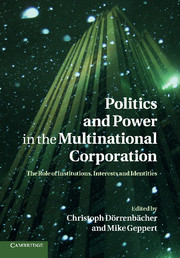 Politics and Power in the Multinational Corporation
Politics and Power in the Multinational Corporation Book contents
- Frontmatter
- Contents
- List of figures
- List of tables
- Notes on contributors
- Foreword
- Part I Introduction
- Part II Politics and power in MNCs: institutions, social embeddedness and knowledge
- Part III Politics and power in MNCs: headquarters–subsidiary relations
- Part IV Politics and power in MNCs: role of national identities and identity work
- 9 Subsidiary manager socio-political interaction: the impact of host country culture
- 10 Unequal power relations, identity discourse, and cultural distinction drawing in MNCs
- 11 National identities in times of organizational globalization: a case study of Russian managers in two Finnish–Russian organizations
- 12 Contesting social space in the Balkan region: the social dimensions of a “red” joint venture
- Part V Conclusions
- Index
- References
11 - National identities in times of organizational globalization: a case study of Russian managers in two Finnish–Russian organizations
Published online by Cambridge University Press: 26 April 2011
- Frontmatter
- Contents
- List of figures
- List of tables
- Notes on contributors
- Foreword
- Part I Introduction
- Part II Politics and power in MNCs: institutions, social embeddedness and knowledge
- Part III Politics and power in MNCs: headquarters–subsidiary relations
- Part IV Politics and power in MNCs: role of national identities and identity work
- 9 Subsidiary manager socio-political interaction: the impact of host country culture
- 10 Unequal power relations, identity discourse, and cultural distinction drawing in MNCs
- 11 National identities in times of organizational globalization: a case study of Russian managers in two Finnish–Russian organizations
- 12 Contesting social space in the Balkan region: the social dimensions of a “red” joint venture
- Part V Conclusions
- Index
- References
Summary
Introduction
While there is quite an extensive literature addressing the issue of individual and organizational identity construction (Alvesson 1994; Phillips and Hardy 1997; Sveningsson and Alvesson 2003; Thomas and Linstead 2002), we still know relatively little about the process of how organizational actors construct their national identities in the MNC context. The dominant view presents national identity as the collective programming of people's minds (Hofstede 1980, 1991). Lacking an agreement as to how to define “culture” (Roberts and Boyacigiller 1984), this view tends to categorize the behavioral patterns of individuals based on a limited set of continuums, e.g. collectivism–individualism, high context–low context, masculinity–femininity, etc. Such conceptualizations represent very static (Tayeb 1994), minimal (McSweeney 2002) and essentialist (Ailon-Souday and Kunda 2003; Barinaga 2007) views on national identity that try to fit it into the predetermined categorizations and fail to take into account the subjectivity and agency of organizational actors in choosing and defining “who they are” (see also chapter of Blazejewski and Becker-Ritterspach in this volume).
This chapter posits that nationalism and national identity provide an important set of discourses that are used to make sense of, to legitimize and to normalize various important issues in MNCs. The national identity construction process is far from being an objective and rational one and national identity per se cannot be viewed as static, given or taken-for-granted (Ailon-Souday and Kunda 2003; Barinaga 2007).
- Type
- Chapter
- Information
- Politics and Power in the Multinational CorporationThe Role of Institutions, Interests and Identities, pp. 346 - 379Publisher: Cambridge University PressPrint publication year: 2011
References
- 3
- Cited by


